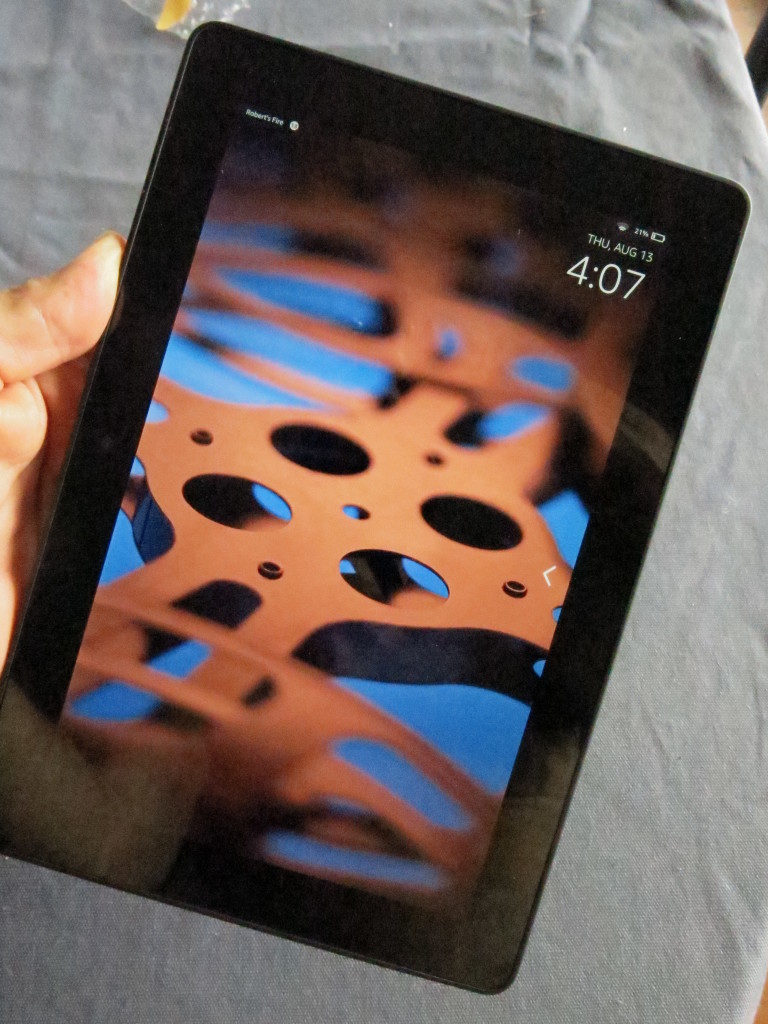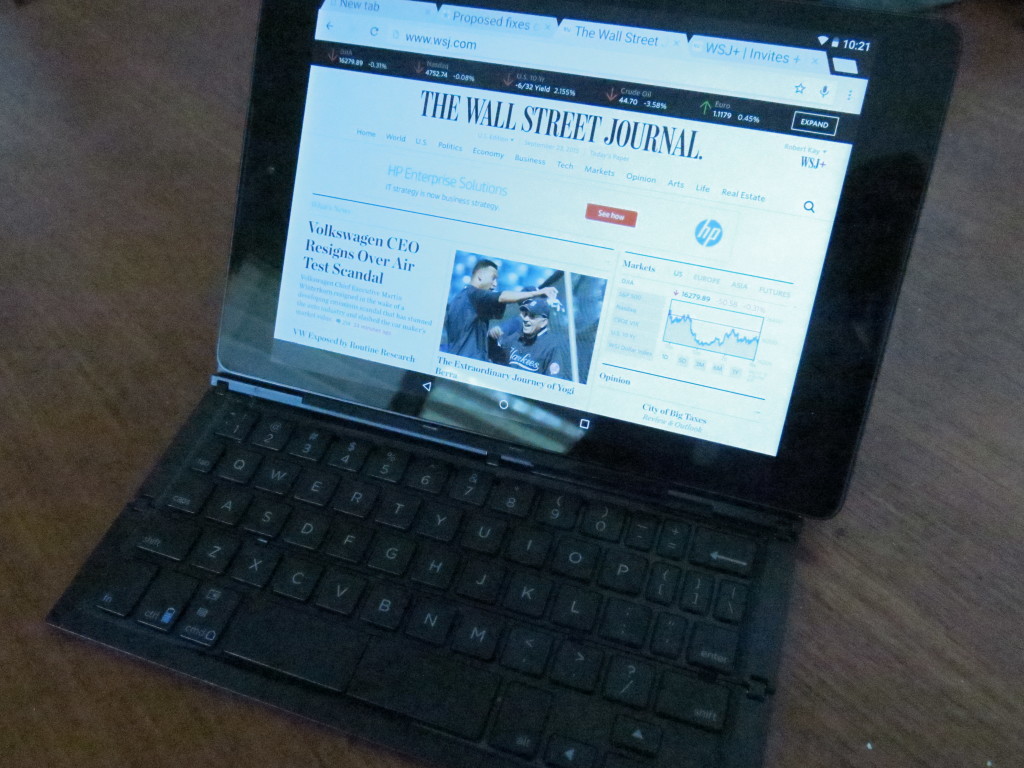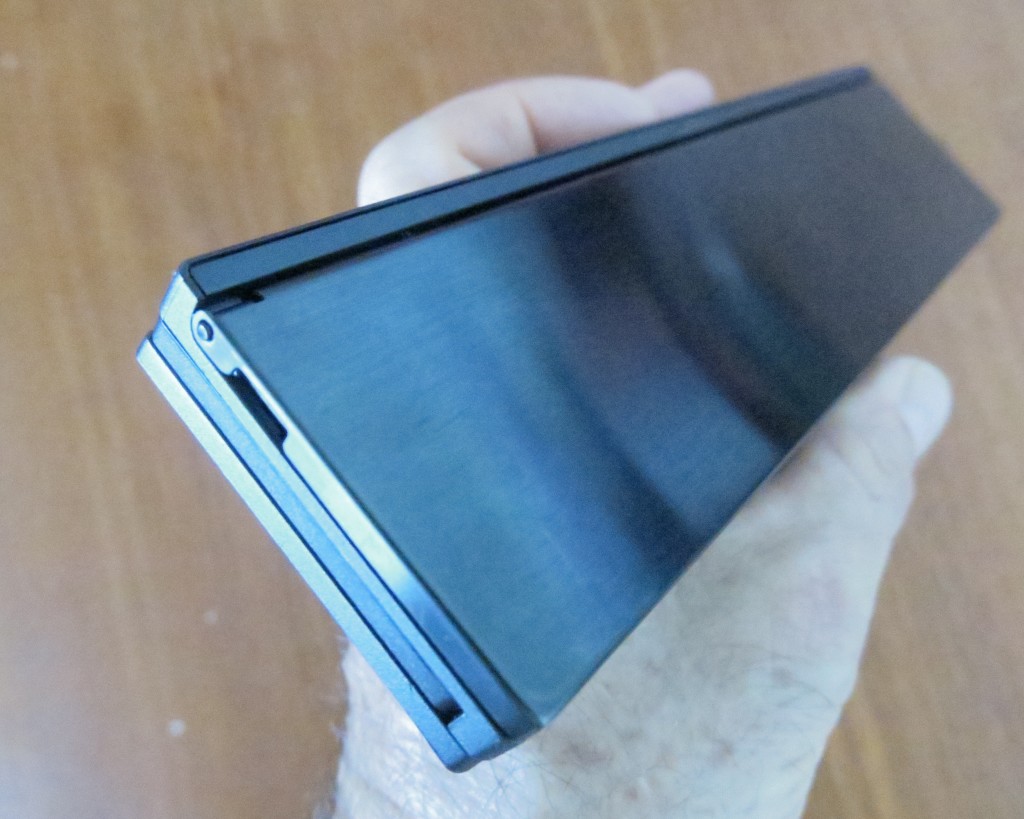| Online: | |
| Visits: | |
| Stories: |

| Story Views | |
| Now: | |
| Last Hour: | |
| Last 24 Hours: | |
| Total: | |
A tale of two tablets…and a keyboard–reviews of Amazon Fire 8.9, Nexus9 and Zagg Pocket Keyboard
TOP INVESTIGATIVE REPORTING AND ONLINE JOURNALISM AWARDS BEST BUSINESS AND GOVERNMENT REPORTING

The Amazon Fire HDX 8.9 tablet offers great color vibrancy. If you’re looking strictly for a video player/reader, it’s a contender for your dollar.
by Rob Kay
Last month the cost of the Wall Street Journal’s annual print subscription for Hawaii readers doubled to more than $1,000, and as a longtime subscriber, I decided I’d had enough. It was time to go digital and join the 21st century. I needed a tablet that was suited for reading e-books, newspapers, and surfing the web. In a pinch it would be nice if the device could operate as a word processor.
What to get?
I evaluated a couple of popular tablets that are both worthy of consideration.
Amazon Fire HDX 8.9
To really understand the Fire HDX 8.9, all you need to recognize is that it’s the latest incarnation of the humble Kindle reading device. Amazon has fine-tuned its tablets for ease of use. The on-off and volume buttons are located on the back (as opposed to the sides), the edges of the tablet are beveled and the HDX’s 8.9-inch screen and 13.2-ounce weight all feel right.
The hardware-software does video very well. The screen is brilliant, the system is fast and the speakers won’t shortchange you. Battery life and power management are first-rate. The only problem I had (and it was pretty insignificant) was that the screen would flicker occasionally. (Perhaps this was a flaw with this particular unit. I couldn’t find any other mentions of it in forums or with other reviewers).
Web surfing is done on Amazon’s proprietary Silk browser, which works satisfactorily but wouldn’t be my first choice.
The hitch with the Fire HDX 8.9 is that if you’re a Chrome user and want all the Google apps, you’re going to be disappointed. There’s no Gmail, no Google Maps, etc., and grabbing documents from any cloud other than Amazon’s is a hassle.
Essentially the device is proprietary and built around the Amazon universe. In a way it’s vehicle to help merchandise their products. Fortunately it’s a nice vehicle. (Think Lexus or Infiniti). If you’re OK with all Amazon, all the time, and want a high-end reader, you’ll be very happy with the Fire HDX 8.9.
If you need a device with more flexibility when it comes to leveraging the web, especially the myriad of Android apps, the Fire HDX 8.9 may not be your cup of tea.
The price starts at $379 for 16 GB storage.
**************************

The Nexus9 is an adroit tablet for those who want all the Google apps. It’s an all around reader/player/web device that’s priced right. Shown here with the Zagg Pocket Keyboard.
Nexus9
I started off with a bit of apprehension about reviewing the Nexus9. It’s manufactured by HTC, which made a phone for Sprint that gave me nothing but grief. Despite this less than stellar memory, I wanted to give Google’s newest tablet, the Nexus9 (also manufactured by HTC) the benefit of the doubt. After all, the tablet is made specifically for Google, which is not to be confused with Sprint. Google did not become one of the most powerful entities in the world by lending its name to crummy products.
I’m really glad I kept an open mind. This tablet is a keeper. But don’t let me get too far ahead of myself…
The Nexus9 has the same general dimensions as the HDX 8.9 and also makes for a good e-reader/video player. The screen quality and display are excellent, but the color saturation isn’t quite as rich as the HDX 8.9. (Not a deal-breaker by any means.)
The tablet is fast and nimble, because it runs the latest Android OS, “Lollipop”. On a practical level, I like this tablet because you can easily adjust brightness controls, which helps keep photos and illustrations readable when you’re in the sun. You can choose between an automatic mode that will adjust the screen brightness according to the ambient light or simply tweak the level to your own satisfaction.
The ergonomics of the tablet are a mixed bag. The placement of the on-off and volume buttons are sort of hidden on the upper right edge. They could be more accessible, but this is a personal preference. The surface, brushed plastic, has a pleasing tactile sense. It simply feels good in your hands.
The dual front-facing speakers generate lots of clean volume — better than you’d expect for a midrange tablet. You can play movies or music videos with plenty of audio gusto. Battery life is very respectable. The Amazon tablet may have a teensy weensy edge in the battery longevity department but in practical terms there’s not a lot of difference. Both tablets do a great job in conserving juice.
A huge plus with the Nexus9 is its integration of Google apps.
I admit in this case I’m positively biased. I own a Samsung phone so am quite used to the Android ‘culture’. Thus if you are already used to Android’s ways, this tablet will fit like an old shoe.
For users who want a tablet that is going to be used as a comprehensive web tool (rather than primarily a reader) the Android factor is a huge advantage over the Amazon product. For example, if you use Google drive or Microsoft’s One Drive, grabbing items out of the cloud is easy. (One of my colleagues, Cindy Ramirez, an avid e-reader and video watcher loved the Amazon product because web functionality was not her priority).
Yes, I like this tablet and recommend it. Price is $363 (with 16 GB).
**************************

The Zagg Pocket Keyboard folds neatly into a package about the size of an old-fashioned slide rule. It works with both Android and Apple tablets and phones.
The Zagg Pocket Keyboard
I happen to be a writer, so any tablet I buy will have to double as a writing tool. At least that’s the theory. The upshot is that to write with any efficiency on a tablet you’re going to need a keyboard. The most popular varieties are clam-shell type arrangements that double as portfolio style cases. It’s good concept the portfolio set-up protects the tablet.
However, if you want a keyboard that will work on multiple devices there are other blue tooth products worthy of consideration.
Zagg’s new “Pocket Keyboard” ($69) breaks new ground by providing a super lightweight platform that you can fold up and yes, carry in your pocket. It will accept just about any mobile device (Apple or Android) up to 9 inches. Unlike the typical carrying case models, it folds into a thin (9-by-2-1/2-by-1/2-inch) rectangle that you carry separately.
I tested it on both the Nexus and the Amazon tablets as well as a Samsung smartphone. The keyboard is small but has a nice “clickable” touch. It’s perfect for the occasional email or touching up a document, but you wouldn’t want to write a novel with it. It came it very handy on a recent airplane flight–I used it to write a eulogy. (Yes, I was probably breaking the rules by using bluetooth on an airplane but suffice it to say, we landed safely).
The main thing you have to get used to is the small footprint.
You’ll have to adjust your typing style because the keyboard is cramped but as they say, there’s no free lunch. It’s not after all, a full sized keyboard so adjustments must be made. That said, it worked really well and after a while I felt comfortable using it.
If you don’t need or want a case/cum keyboard and like the option of having one, very transportable item for all your mobile devices, this is a winner. It’s priced at $69.
Photos by Rob Kay
Questions? Comments? Feel fee to Email Me
Use Facebook to Comment on this Post
Source: http://www.hawaiireporter.com/a-tale-of-two-tablets-and-a-keyboard-reviews-of-amazon-fire-8-9-nexus9-and-zagg-pocket-keyboard/123



